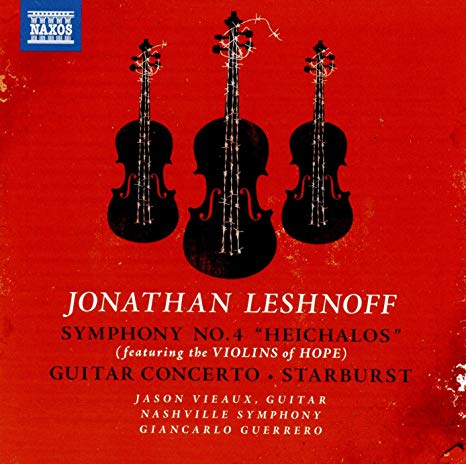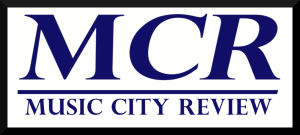CD Review
Jonathan Leshnoff: Symphony No. 4 “Heichalos”, Guitar Concerto, and Starburst by The Nashville Symphony Orchestra
This 2019 live recording release from Naxos presents Leshnoff’s Symphony No. 4 commissioned for the Nashville Symphony’s Violins of Hope project. The Violins of Hope are a collection of stringed instruments that were played by Jewish musicians during the Holocaust and have been restored and recorded on this album. The  composer believes his symphony represents a parallel to the Violins of Hope as an embodiment of Jewish survival. While the violins are a physical embodiment, Leshnoff’s music provides a more spiritual one. The subtitle, “Heichalos,” refers to an ancient text describing a way to achieve a divine communion through meditating oneself through “rooms” of deeper consciousness. In just two parts rather than traditional symphonic movements, Leshnoff intends for listeners to experience the musical depiction of each of these rooms. Bold chords set the tone for the beginning of Part I and the brass section is featured in the opening passages of thick orchestration. Although a dark overall mood is achieved, harp and woodwind help provide an ethereal characteristic to the heaviness of Part I shortly before a climactic ending.
composer believes his symphony represents a parallel to the Violins of Hope as an embodiment of Jewish survival. While the violins are a physical embodiment, Leshnoff’s music provides a more spiritual one. The subtitle, “Heichalos,” refers to an ancient text describing a way to achieve a divine communion through meditating oneself through “rooms” of deeper consciousness. In just two parts rather than traditional symphonic movements, Leshnoff intends for listeners to experience the musical depiction of each of these rooms. Bold chords set the tone for the beginning of Part I and the brass section is featured in the opening passages of thick orchestration. Although a dark overall mood is achieved, harp and woodwind help provide an ethereal characteristic to the heaviness of Part I shortly before a climactic ending.
The Violins of Hope feature in the contrasting Part II with long, lightly woven lines that Leshnoff gently incorporates with brass foundations and flute contributions. A sense of seriousness pervades the entire symphony and there is no doubt the musicians were committed to performing with sincerity, especially those using instruments from the collection. In the music score, the composer has inserted a question before Part II begins: “Who do you love?” and at the end, “Where are they now?” The reflective interpretation of the Nashville Symphony is made permanent on this recording, one that conductor Giancarlo Guerrero says the musicians are so honored to make.
Also on this album is renowned guitarist Jason Vieaux performing live Jonathan Leshnoff’s Guitar Concerto. The vibrant, three movement work proves no easy task for the

performer but Vieaux’s clarity is exceptional considering Leshnoff has written many bright runs in the upper register and descending arpeggio passages. The first movement is a fine movement to represent a modern guitar concerto while the Adagio and Finale movements implement the tried and true styles of guitar and orchestra writing. The Finale is definitely lively and full of dance-like spirit. Overall the orchestration is well-done and makes the concerto a decent addition to the repertoire.
Starburst is an eight minute, compact orchestral piece as exciting and stunning as its name. The strings race away from the start with rhythmic ferocity, punctuated by the timpani. At a climactic chord in the middle, every instrument falls away except the clarinet. It is left to float a long melody over the space that is suddenly created. Leshnoff says this moment in Starburst is one of his favorite places in his own music. A popular opening piece, the recording of Starburst by Nashville Symphony Orchestra will be the reference for future performances.
This stamp of ownership is something Guerrero is proud of and notes that the live recording of all three pieces benefited from the composer getting to work closely with the orchestra in many stages of rehearsals. The Nashville Symphony has established itself as a reliable group for producing quality classical recordings and that will make a lot of patrons in Music City very happy.



